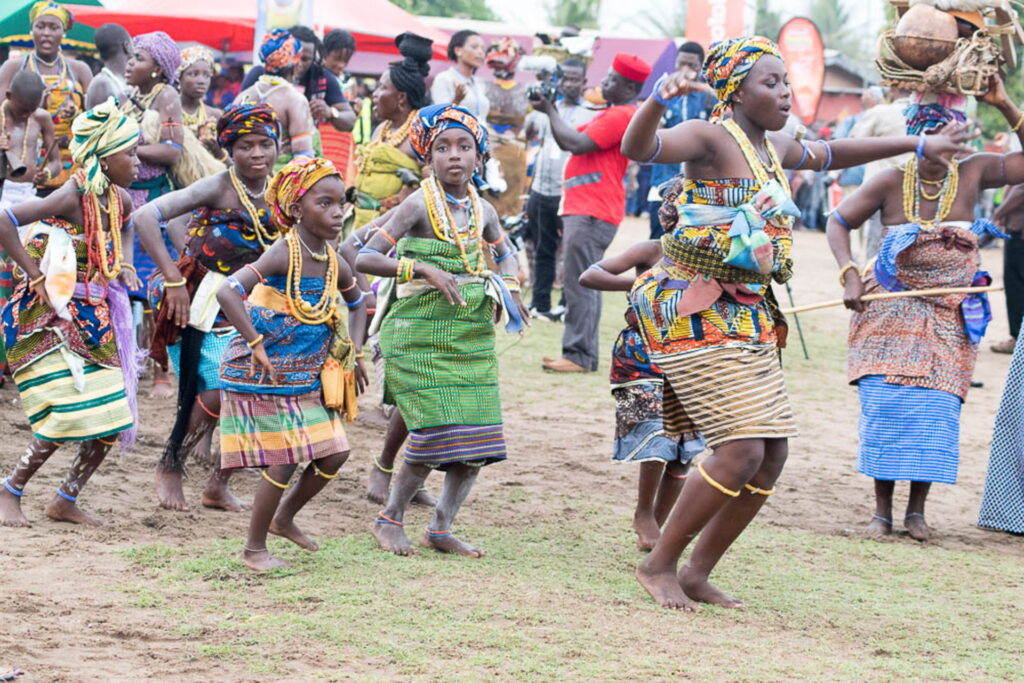
Discover the history, cultural significance, and modern growth of the Hogbetsotso Festival, a vibrant celebration of the Anlo Ewe people in Ghana’s Volta Region. Introduction
The Hogbetsotso Festival is one of Ghana’s most vibrant and culturally rich traditional festivals celebrated by the Anlo Ewe people in the Volta Region. This annual festival serves as a profound expression of history, unity, and thanksgiving, commemorating the migration and resilience of the Anlo Ewe ancestors. Rich in customs, music, dance, and rituals, Hogbetsotso draws thousands of visitors and holds deep significance for both the local community and Ghana’s cultural landscape.
This blog post explores the origins, development, and enduring importance of the Hogbetsotso Festival, highlighting how it has grown from a traditional observance into a major cultural event that promotes unity, heritage, and tourism. Whether you are interested in Ghanaian festivals, African traditions, or cultural tourism, understanding the Hogbetsotso Festival offers valuable insights into the identity and spirit of the Ewe people.
Early Background and Origins of the Hogbetsotso Festival
The Hogbetsotso Festival, which means “the festival of the exodus,” commemorates the historic migration of the Anlo Ewe people from Notsie in present-day Togo to their current settlements in Ghana’s Volta Region. According to tradition, the Anlo Ewe escaped the oppressive rule of King Togbe Agorkoli in Notsie by cleverly breaking through the city walls under the cover of darkness.
This exodus symbolizes freedom, resilience, and unity—the core values celebrated annually during the festival. The Hogbetsotso Festival’s roots date back centuries, passed down through oral histories and practiced through ritual ceremonies that honor ancestors and reaffirm communal bonds.
Rise and Development of the Hogbetsotso Festival
Over time, Hogbetsotso has evolved into a large-scale festival attracting not only locals but also visitors from across Ghana and beyond. Key elements of the festival’s development include:
- Expansion of Festivities: The festival now spans several days, featuring traditional drumming, dancing, durbars of chiefs, and public addresses.
- Cultural Preservation: Hogbetsotso serves as a platform for preserving and promoting Ewe language, customs, and folklore.
[23:18, 18/08/2025] ChatGPT: – Tourism Growth: Increased interest from tourists has turned the festival into an important cultural tourism event for the Volta Region. - Media Coverage: Modern media exposure has helped share Hogbetsotso’s significance with a global audience.
- Youth Engagement: Efforts to involve younger generations ensure that the festival’s cultural legacy endures.
The festival’s evolution reflects its vital role in maintaining cultural identity while adapting to contemporary contexts.
Achievements and Importance of the Hogbetsotso Festival
The Hogbetsotso Festival holds multiple layers of importance:
- Cultural Identity: It fosters a strong sense of identity among the Anlo Ewe, celebrating their history, language, and traditions.
- Community Unity: The festival reunites the Anlo Ewe and their diaspora, strengthening social cohesion.
- Economic Impact: Local businesses and artisans benefit from the influx of visitors, boosting the regional economy.
- Tourism Promotion: Hogbetsotso attracts cultural tourists eager to experience authentic Ghanaian traditions.
- Education: The festival educates younger generations and outsiders about Anlo history and customs.
Its role as a cultural beacon helps safeguard intangible heritage while contributing to community development.
Challenges and Controversies Surrounding the Hogbetsotso Festival
Despite its successes, the Hogbetsotso Festival faces challenges:
- Modernization vs Tradition: Balancing modern influences with traditional practices can cause tensions.
- Funding and Logistics: Organizing a large festival requires substantial resources, which can be inconsistent.
- Environmental Concerns: Managing waste and environmental impact during festivities is an ongoing issue.
- Commercialization Risks: Over-commercializing the festival could dilute its cultural significance.
- Youth Involvement: Engaging younger people deeply in traditions remains a critical challenge.
Addressing these concerns is vital for preserving the authenticity and sustainability of the festival.
Legacy and Modern Relevance of the Hogbetsotso Festival
The Hogbetsotso Festival stands as a powerful symbol of freedom and cultural pride for the Anlo Ewe and Ghana at large. Its legacy is not only in commemorating a historical migration but also in fostering unity, cultural continuity, and tourism development.
In modern Ghana, Hogbetsotso remains relevant by adapting to contemporary challenges, incorporating social causes, and embracing digital platforms to reach wider audiences. The festival continues to inspire pride and awareness of Ghana’s diverse cultural heritage.
Conclusion
The Hogbetsotso Festival is a vibrant testament to the resilience, unity, and rich cultural heritage of the Anlo Ewe people. From its origins in a historic exodus to its modern celebration as a major cultural event, Hogbetsotso plays a vital role in preserving traditions, boosting tourism, and strengthening community ties. As Ghana’s cultural tourism continues to grow, festivals like Hogbetsotso remind us of the power of history and culture in shaping identity and fostering development.
FAQs About the Hogbetsotso Festival
Q1: What does Hogbetsotso mean?
A1: Hogbetsotso means “festival of the exodus,” commemorating the Anlo Ewe people’s escape from Notsie.
Q2: When is the Hogbetsotso Festival celebrated?
A2: The festival is usually celebrated in the first week of November every year.
Q3: What are the main activities during Hogbetsotso?
A3: Key activities include durbars of chiefs, traditional drumming and dancing, storytelling, and rituals honoring ancestors.
Q4: How does Hogbetsotso promote tourism?
A4: It attracts visitors who want to experience Ghanaian culture firsthand, boosting local businesses and crafts.
Q5: What challenges does the festival face today?
A5: Challenges include balancing tradition with modernization, funding issues, environmental impact, and engaging youth.
RECOMMENDED ARTICLES
- Hogbetsotso Festival: Celebrating Ewe Heritage and Ghanaian Culture
- Damba Festival: Celebrating Northern Ghana’s Rich Cultural Heritage
- Free Senior High School Policy in Ghana: Access, Impact, and Future Prospects
USEFUL LINKS
